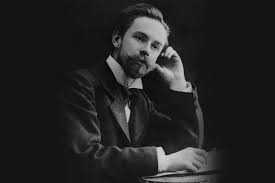Alexander Scriabin, the Russian composer and visionary, is renowned for his deeply spiritual, enigmatic, and transcendental music. Known for pushing boundaries in harmonic language, Scriabin’s works create an intense, mystical experience for listeners, elevating music to a medium of metaphysical expression. From fiery preludes to cosmic symphonies, each of his compositions is a window into his evolving philosophy. Here, we’ll explore five of Scriabin’s most profound compositions, each one a masterpiece of mood, innovation, and emotional depth.
1. Poem of Ecstasy, Op. 54 (1905-1908)
Also known as Symphony No. 4, The Poem of Ecstasy epitomizes Scriabin’s ambitious vision to combine music, poetry, and philosophy. This lush, symphonic work features dramatic shifts, transporting listeners from moments of quiet contemplation to explosive passion. The themes of ecstasy and transcendence resonate throughout, expressed through complex chromaticism and harmonic tension. Scriabin envisioned the piece as a symbol of human aspiration, an invocation of self-realization.
Listen for: The persistent, soaring trumpet theme, symbolizing ecstasy, and the continuous harmonic shifts, which create a sense of boundless energy and transcendence.
2. Piano Sonata No. 5, Op. 53 (1907)
Scriabin’s Piano Sonata No. 5 is a landmark in the evolution of the modern sonata form. He abandons traditional structure, crafting a single-movement piece driven by thematic exploration and harmonic color. This sonata is known for its technical demands on the pianist, requiring extraordinary control, precision, and expressive range. The music moves from moments of tranquil beauty to frenzied climaxes, evoking a journey into a surreal inner world.
Listen for: The hypnotic, ethereal opening motif that gives way to cascades of notes, marked by Scriabin’s characteristic use of dissonance and harmonic ambiguity.
3. Vers la flamme (Towards the Flame), Op. 72 (1914)
Vers la flamme is a stunning late piano piece that epitomizes Scriabin’s fascination with mystical themes. He conceived this piece as a metaphor for the world moving toward enlightenment, or perhaps annihilation, through fire. Written in his final years, it’s both atmospheric and forward-looking, with dense chromatic harmonies and unusual melodic lines. The piece builds intensity toward a fiery, climactic end, embodying Scriabin’s vision of mystical ascension.
Listen for: The gradual layering of tension and the dramatic, incandescent climax, capturing the feeling of an unstoppable force of nature.
4. Piano Concerto in F-sharp minor, Op. 20 (1896)
Scriabin’s Piano Concerto was his only work in this genre, blending lyrical beauty with virtuosic demands. Written when he was just 24, the concerto is relatively traditional compared to his later works but bears early signs of his evolving style. This piece’s delicate, singing lines and intricate harmonies showcase Scriabin’s gift for melody and expression. The final movement is both technically challenging and emotionally rich, highlighting his signature fusion of passion and poetry.
Listen for: The beautiful interplay between the piano and orchestra, especially in the gentle yet expressive second movement.
5. Mysterium (Unfinished)
Though never completed, Mysterium represents Scriabin’s ultimate artistic and philosophical vision: a grand, synesthetic work intended to transform the world spiritually. Scriabin envisioned it as a multi-day, immersive experience with music, dance, color, and even scent, intended to lift humanity to a higher plane of existence. Although only fragments and sketches remain, Mysterium has inspired many composers and mystics and serves as a symbol of Scriabin’s idealism and spiritual quest.
Legacy and Influence: While Mysterium was never fully realized, the concept alone solidifies Scriabin’s legacy as a visionary, eager to explore beyond the limits of traditional music.
Final Thoughts
Alexander Scriabin’s compositions are more than music; they’re philosophical statements. His works, filled with passion and cosmic ambition, invite listeners into a world of introspection, ecstasy, and transcendence. Whether through the rapturous power of Poem of Ecstasy or the fiery intensity of Vers la flamme, Scriabin’s music remains one of the most unique, challenging, and mesmerizing bodies of work in classical music history.


Comments are closed